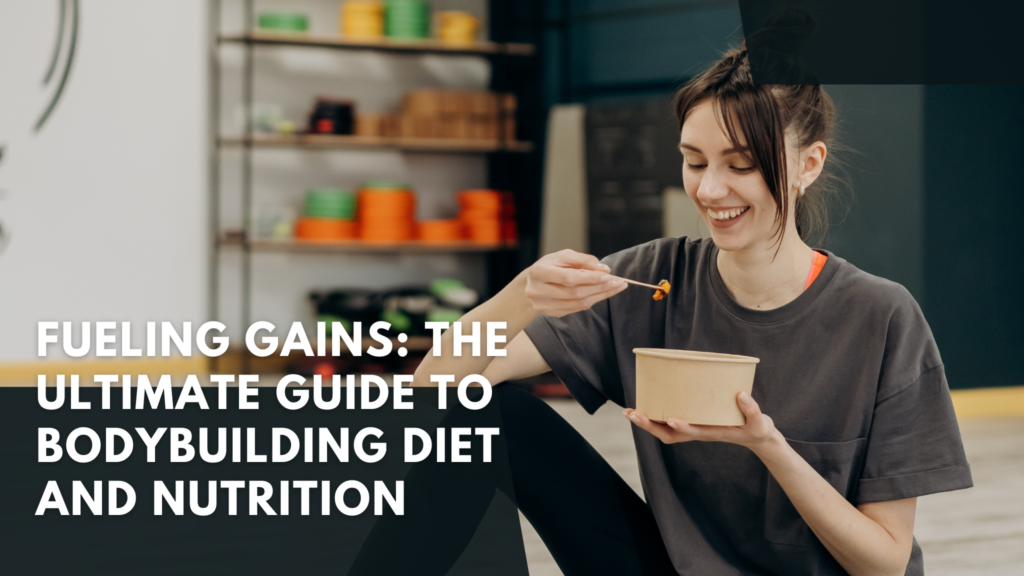Introduction
Starting your bodybuilding journey can be both exciting and daunting. One aspect that can’t be overlooked is diet and nutrition. You’ve probably heard the saying, “abs are made in the kitchen,” and forbuilders, this couldn’t be more true. This article aims to provide a comprehensive guide on bodybuilding diet and nutrition, breaking down the essential components required to help you achieve your muscle-building goals effectively.
Understanding Macronutrients
When it comes to bodybuilding, the macronutrients—proteins, carbohydrates, and fats—play critical roles. Each macronutrient serves a specific purpose in muscle development and overall health.
Protein: The Building Block
Protein is fundamental in repairing and building muscle tissue. It’s essential to consume enough protein to support your rigorous training regimen.
- Sources: Foods rich in protein include chicken breast, eggs, fish, beans, and lean beef.
- Recommendations: Aim for 1.2 to 2.2 grams of protein per kilogram of body weight per day.
“Your body can’t store protein, so you need to consume it regularly to maintain muscle mass.”
Carbohydrates: Energy Resource
Carbohydrates serve as your primary energy source. They provide the fuel necessary for intense workouts.
- Sources: Opt for complex carbs such as brown rice, sweet potatoes, oats, and whole grains.
- Timing: Consuming carbs pre-workout can help sustain energy levels, while post-workout carbs assist in glycogen replenishment.
Healthy Fats: Essential for Hormonal Balance
Fats often get a bad rap, but they are essential for hormone production, including testosterone, which is crucial for muscle building.
- Sources: Include sources like avocados, nuts, olive oil, and fatty fish in your diet.
- Recommendations: Healthy fats should comprise about 20-30% of your daily caloric intake.
The Importance of Micronutrients
While macronutrients get most of the attention, micronutrients—vitamins and minerals—are equally important. They support various bodily functions, including muscle contraction and repair.
Vitamins and Minerals
- Iron: Essential for oxygen transport to muscles.
- Calcium: Vital for muscle contraction and bone health.
- Vitamin D: Enhances calcium absorption and supports muscle function.
“Don’t underestimate the power of vitamins and minerals; they can boost your performance more than you might think.”
Meal Timing and Frequency
When it comes to bodybuilding, not only what you eat but also when you eat can influence your results.
Pre-Workout Nutrition
Eating a balanced meal of proteins and carbs an hour or two before your workout supplies sustained energy and supports muscle endurance.
Post-Workout Nutrition
Post-workout nutrition is crucial for recovery. Consuming a meal rich in protein and carbs within 30 minutes to an hour post-workout can maximize muscle protein synthesis.
Frequent Meals
Some bodybuilders prefer eating smaller, frequent meals throughout the day to ensure a steady supply of nutrients. This strategy can help maintain energy levels and prevent overeating at any single meal.
Hydration Matters
Hydration is often overlooked but is incredibly important for both performance and recovery.
Water
Aim to drink at least 8-10 glasses of water daily, but remember that your needs may increase with intense workouts and higher protein intake.
Electrolytes
Replenishing electrolytes lost through sweat is also essential. Consider adding a balanced electrolyte drink, especially during prolonged exercise sessions.
Supplements: Beneficial or Not?
Supplements can offer additional support, but they should not replace a well-balanced diet.
- Protein Powders: Convenient but should supplement, not replace, whole foods.
- Creatine: Proven to enhance muscle mass and strength.
- BCAAs: May help reduce muscle soreness and enhance recovery.
“Supplements are a tool, not a crutch. Your primary nutrition should come from whole foods.”
Conclusion
Achieving your bodybuilding goals requires a balanced approach to diet and nutrition, coupled with a dedicated training regimen. By understanding and properly integrating macronutrients, micronutrients, meal timing, hydration, and supplements into your daily routine, you can maximize your muscle gain and overall performance. Remember, consistency is key, and what you do in the kitchen is just as important as what you do in the gym.
Take the time to plan your meals, stay hydrated, and listen to your body’s needs. Your physical transformation is a marathon, not a sprint. Keep pushing forward, and the results will follow.
Feel free to dive deeper into specific nutritional strategies or speak with a nutritionist for a more personalized plan. https://moshiping.shop/the-ultimate-guide-to-effective-muscle-building-workouts/The journey to peak physical fitness doesn’t have to be walked alone.
Source: Bodybuilding Nutrition Guide
Takeaway Message: Consistency in diet, proper meal timing, and adequate hydration are your allies in the pursuit of muscle gains. Now go and fuel those gains!


